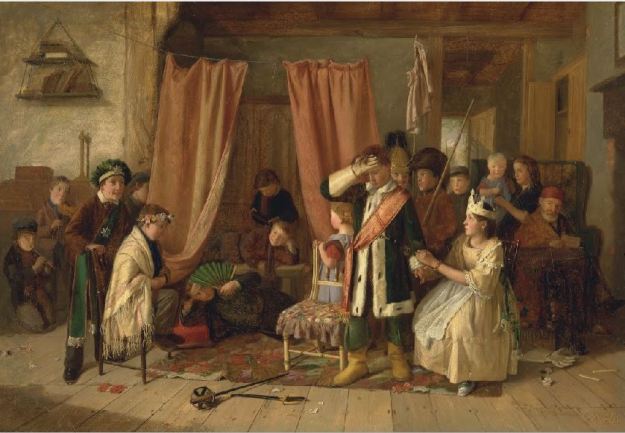STAGE KISSES IN TETON CITY.
Why the Eventual Husband Permitted Them
It was a home-talent show, and we sat patiently waiting for the unexpected to happen. The unexpected always happens with a home-talent show, and an inner mountain village is not proof against this long-accepted stage fact. We strangers from the unregenerate East, who were there in the mountains for our health’s sake, felt assured, therefore, of an experience before the night should be over.
It was “The Mikado “which was to be presented, tattered and torn by its transit from first-class theatres in the East to the Town Hall of Teton City [Idaho.] We had heard Nanki-Poo as he had sung about being a thing of shreds and patches, and we had heard Ko-Ko’s announcement of his theories and ideas, and were getting along fairly well in our listening when the kissing song was reached. Then Red Pete Barker, who was singing Nanki-Poo, advanced to the footlights.
“Ladies and gentlemen,”the tenor singer began, “this is a mighty poor place in the show to interrupt the proceedings to make a speech, but as certain things are about to happen, I think it is only fair that you be put on. I have heard that Holy Moses Perkins, who is known and generally hailed and greeted as the eventual husband of Miss Betty Hoyler, who is taking the part of Yum Yum, has announced to all concerned that if I followed out the directions of the book in this play and insist on kissing the lady, there will be five different kinds of trouble. I hereby announce that I am going to begin kissing the young lady in about three minutes, and shall keep right on kissing her through the whole blamed song, and I further announce that I shall do that kissing in full view of the audience.
“Moreover, it may be of interest to you to know that I have secreted in these long and flowing robes two first-rate six-shooters right ready for business. I am also armed with the fact that Holy Moses Perkins is sitting in seat No. 167, which is in plain view from the stage. As the scene which is about to be presented is a cross between a delicious love-song and a homicide, and as I shall caress the young woman with one eye on her beauteous charms and the other on seat No. 167, I hope you will overlook any little shortcomings in the affair. I hate to mention such low, coarse things, but the gun which I shall use first is a self-cocker and has been recently oiled. Thanking you for your kind attention, the show will now go on.”
We listened to the rendition of the kiss-kiss song with great interest, especially those who were in range of seat No. 167. Nothing happened, however, Mr. Perkins remaining statuesquely mute. But when the applause continued on its demand for an encore, Mr. Barker appeared once more at the stagefront:
“Thank you,” he said, “for this vindication, but if you want some more of it I am compelled to say you can’t have it. I respect Mr. Perkins’s claims on the premises. Thank you, one and all, and especially Mr. Perkins, who has this night sacrificed his feelings for the advancement of art. The show will now proceed,”
We then leaned back and listened respectfully while Pooh-Bah told about his troubles and expectations. — Chicago Record.
The Argonaut. [San Francisco, CA] 24 January 1898
Mrs Daffodil’s Aide-memoire: In case Mrs Daffodil’s readers have not seen The Mikado recently, here are the lyrics to the “kissing song.” Mrs Daffodil feels it is all rather nonsensical, but Mr Gilbert and Mr Sullivan do have their followers.
Nanki-Poo
Were you not to Ko-Ko plighted,
I would say in tender tone,
“Loved one, let us be united —
Let us be each other’s own!”
I would merge all rank and station,
Worldly sneers are nought to us,
And, to mark my admiration,
I would kiss you fondly thus —
[Kisses her]
Both
I/He would kiss you/me fondly thus —
[Kiss]
Yum-Yum
But as I’m engaged to Ko-Ko,
To embrace you thus, con fuoco,
Would distinctly be no gioco,
And for yam I should get toco —
Yum-Yum
Nanki-Poo
Toco,
Toco,
toco,
toco,
toco,
toco,
toco,
toco,
toco!
toco!
Nanki-Poo
So, In spite of all temptation,
Such a theme I’ll not discuss,
And on no consideration
Will I kiss you fondly thus —
Will I kiss you fondly thus —
[Kissing her]
Let me make it clear to you,
This is what I’ll never do!
This, oh, this, [kiss]
Oh, this, [kiss]
Oh, this, — [kiss]
This is what I’ll never, never do!
Yum-Yum
Nanki-Poo
This, oh, this —
Oh, this —
Oh, this —
This, oh, this —
Oh, this —
Oh, this —
This, This is what I’ll never do!
He’ll never do!
I’ll never do!
He’ll never do!
Oh, this —
This is what he’ll never, never do!
This is what I’ll never, never do!
Mrs Daffodil invites you to join her on the curiously named “Face-book,” where you will find a feast of fashion hints, fads and fancies, and historical anecdotes
You may read about a sentimental succubus, a vengeful seamstress’s ghost, Victorian mourning gone horribly wrong, and, of course, Mrs Daffodil’s efficient tidying up after a distasteful decapitation in A Spot of Bother: Four Macabre Tales.



